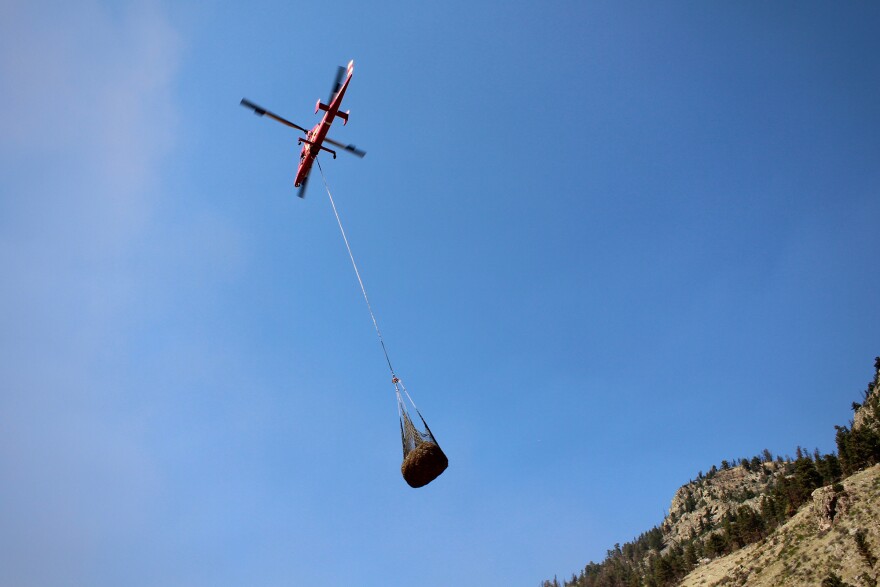Work to protect water quality on the northern Front Range resumes this week with a whir of helicopter blades in Poudre Canyon. For the second year in a row, those aircraft will drop mulch on areas burned by the Cameron Peak Fire in 2020 — an effort to stabilize burned soil and keep ashy debris out of rivers.
Colorado’s largest-ever wildfire left a charred moonscape, with soil turned into gray dust and shards of blackened trees and plants littering the ground. When it rains, ash and sediment can be swept downhill into rivers that supply water to town pipes. In 2021, that forced the City of Fort Collins to stop treating water from the river and switch to an alternate supply from Horsetooth Reservoir.
“In some cases, turbidity — a measure of how much material is in the water — exceeded 1000 units, which is 10 times the shut-down threshold for water treatment operations, and approximately 200 times the typical pre-fire levels,” said Jill Oropeza, director of water quality services for Fort Collins Utilities.
The cities of Loveland and Greeley also draw water from the burned area, and are partners in the "aerial mulching" efforts along with the Coalition for the Poudre River Watershed, Big Thompson Watershed Coalition and the U.S. Forest Service.
Last year, crews dropped wood shards on 5,050 acres in the Cache La Poudre and Big Thompson watersheds. This summer, they hope to cover nearly 5,000 more — with 3,500 acres identified near the Poudre and 1,200 acres near the Big Thomspon.

Those efforts aren’t cheap. Last year’s aerial mulching work cost $11 million. Keeping a helicopter in the air costs $87 each minute, but local utilities justify the expense as a precaution against even more costly treatment that would be necessary without it.
“If we don’t do this mitigation work,” said Jen Petrzelka, Greeley’s water right’s manager, “we will see increased water quality issues that create increased costs because we need more chemicals. That could be reflected on your bill. But by doing this work, we are doing our best to keep our ratepayers’ bills steady and not see any increases.”
Contractors will begin 2022’s aerial mulching campaign on Thursday, July 14, starting in the Pingree Park area. It will continue through the summer and fall.

As climate change makes wildfires more frequent and more intense — four of Colorado’s five largest-ever wildfires occurred since 2018 — there will be an increased need for expensive post-fire mitigation and safety work.
“Aerial mulching is really one of the best ways we can treat a large, high severity burn area at the landscape-scale, which is why it has been our main focus over the past two summers,” said Hally Strevey, executive director for the Coalition for the Poudre River Watershed.
This story is part of ongoing coverage of water in the West, produced by KUNC in Colorado and supported by the Walton Family Foundation. KUNC is solely responsible for its editorial coverage.






